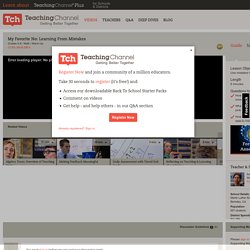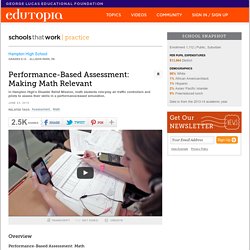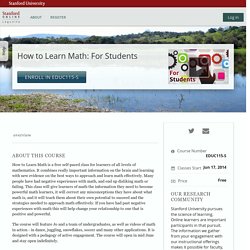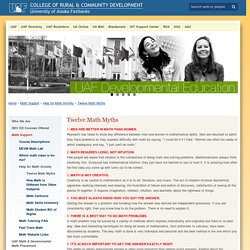

Classroom Warm-Up Routine: Math Class Warm-Up. Register Now and join a community of a million educators.

Take 30 seconds to register (it's free!) And: Access our downloadable Back To School Starter PacksComment on videosGet help - and help others - in our Q&A section Register Now Already registered? Learn about Teaching Channel Plus for Schools & Districts Sign In or Sign Up My Favorite No: Learning From Mistakes Grades 6-8 / Math / Warm-Up CCSS: Math.MP.6 Common Core State Standards Embed Video Great Lesson Ideas: My Favorite No with Leah Alcala [01:00:10;24] Leah: Hi.
Error loading player: No playable sources found <div>Please enable Javascript to watch this video</div> Related Videos Approaches to Poetry: Pre-Reading Strategies Grades 6-12 / ELA / Tone & Theme ELA.RL.8.410424 > Lesson Objective Use mistakes to quickly clarify concepts Length 6 minutes Questions to Consider How does this strategy allow for immediate re-teaching? Teacher & School Info Leah Alcala Math / Teacher Follow School Details Martin Luther King Middle SchoolBerkeley, CA Feedback.
Using Groups In The Classroom: Assess And Group. Performance-Based Assessment: Making Math Relevant. Joan: The students have ownerships of the material, and it clearly demonstrates their knowledge.

Jeff: We ask our teachers is the performance that we want from kids short-term memory? Or do we want comprehensive understanding of big ideas? We use the term Performance-Based Assessment to challenge our teachers to put the measuring stick against the student demonstration of application. The performance of analysis. Student: Did you remember to go from North first? Student: Fifty-nine degrees and then eleven... Jeff: Is the performance that I can solve an algorithm that was handed to me on a piece of paper? Joan: We wanted to come up with a Performance-Based Assessment, so we sat down at a table and just started saying these are the things that we wanted to assess. Andrew: We had a discussion about, "Where can I integrate something relevant in this unit I'm doing on polar coordinates. " Mary: Like the kind you would see on radar blips, you know, directing a plane or a ship. Math Mindsets. How to Learn Math: For Students.
How to Learn Math is a free self-paced class for learners of all levels of mathematics.

It combines really important information on the brain and learning with new evidence on the best ways to approach and learn math effectively. Many people have had negative experiences with math, and end up disliking math or failing. This class will give learners of math the information they need to become powerful math learners, it will correct any misconceptions they have about what math is, and it will teach them about their own potential to succeed and the strategies needed to approach math effectively. If you have had past negative experiences with math this will help change your relationship to one that is positive and powerful. The course will feature Jo and a team of undergraduates, as well as videos of math in action - in dance, juggling, snowflakes, soccer and many other applications. Growth Mindset Maths - Growth Mindset Maths.
BOUNCE BY MATTHEW SYED THE MYTH OF TALENT AND THE POWER OF PRACTICE. College of Rural & Community Development. 1.

MEN ARE BETTER IN MATH THAN WOMEN. Research has failed to show any difference between men and women in mathematical ability. Men are reluctant to admit they have problems so they express difficulty with math by saying, "I could do it if I tried. " Women are often too ready to admit inadequacy and say, "I just can't do math. " 2. 3. 4. 5. 6. 7. 8. 9. The Myth of 'I'm Bad at Math' - Miles Kimball & Noah Smith. “I’m just not a math person.”

We hear it all the time. And we’ve had enough. Because we believe that the idea of “math people” is the most self-destructive idea in America today. The truth is, you probably are a math person, and by thinking otherwise, you are possibly hamstringing your own career. Worse, you may be helping to perpetuate a pernicious myth that is harming underprivileged children—the myth of inborn genetic math ability. Is math ability genetic? How do we know this? Different kids with different levels of preparation come into a math class. Thus, people’s belief that math ability can’t change becomes a self-fulfilling prophecy. The idea that math ability is mostly genetic is one dark facet of a larger fallacy that intelligence is mostly genetic. A body of research on conceptions of ability has shown two orientations toward ability.
You have a certain amount of intelligence, and you really can’t do much to change it. The results? Inspiring Students to Math Success and a Growth Mindset.